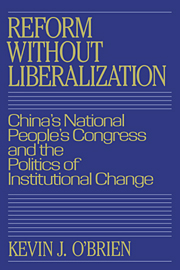 Reform without Liberalization
Reform without Liberalization 7 - Structural reforms
Published online by Cambridge University Press: 22 March 2010
Summary
When the NPC reemerged in 1978, China was at a crossroads. The Third Plenum was nine months away and Deng Xiaoping had yet to consolidate his power. The first post-Mao constitution accurately reflected the unsettled political situation: it both praised the Cultural Revolution and promised a return to predictable, nondisruptive patterns of rule; it granted the NPC more powers than it had in 1975, but fewer than it had from 1954 to 1966. Two years after Mao's death, the NPC resembled the mobilization congresses of the late 1950s. The organizational obstacles to legislative development – indirect elections; brief, infrequent sessions; large size; weak committees – remained in place.
As 1978 progressed, Deng's power increased. By the end of the year, he was able to control the agenda of the party's Third Plenum and to initiate a decisive break with the policies of the Cultural Revolution. Although Deng was in ascendance, his power was far from absolute. Hua Guofeng reigned as Mao's handpicked successor and beneficiaries of the Cultural Revolution held key positions throughout the nation. Often outmanned in leadership councils, Deng turned to allies on the fringe of power (typically academics and advisers in theory, planning, and propaganda) to publicize and build support for his policies. Through the press, he put pressure on his political opponents and aligned himself with the forces of reform. From 1979 to 1982, a loose coalition of reformist intellectuals drew support from Deng and published scores of articles elaborating his ideas.
- Type
- Chapter
- Information
- Reform without LiberalizationChina's National People's Congress and the Politics of Institutional Change, pp. 125 - 156Publisher: Cambridge University PressPrint publication year: 1990
- 1
- Cited by


